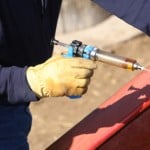PETA Gets Government to Do Its Job
Anyone who’s ever written to the government or their MP about animal experiments is likely to have received a letter back claiming that the UK has the strictest rules on animal experiments in the world. As part of my job, I look at exactly how our “strict rules” are implemented and what they mean for animals – and the picture I get is often rather different.
A year and a half ago, PETA asked the government what action it was taking about certain routine animal tests that could easily be discontinued. We thought it was a pretty simple question about vaccine testing. As it turns out, it wasn’t so simple, but as a result of our persistence, the government has now taken steps to discontinue these particular tests.
Because vaccines are made from live viruses, there can be variations in the strength and safety of different batches of the same vaccine. To detect this problem in veterinary vaccines, each new batch has traditionally been tested on the “target” animals (ie, on cows for cow vaccines, cats for cat vaccines, etc) in a practice known as “target animal batch safety testing”, or TABST.
Rules introduced in 2005, however, allow companies to avoid conducting TABST if they take certain other steps – the companies then just have to apply to European regulators for permission to stop the testing. To ensure that companies here in the UK were taking all these steps, in 2008 we asked the Home Office (HO) – which approves all animal testing in the UK – to confirm that no tests were taking place that could be avoided. Instead of confirming that our “strict rules” were preventing companies from doing the tests, the HO responded that it didn’t know whether the non-required animal tests were happening or not – pretty shocking considering that it has a legal obligation not to hand out permission for any animal tests that can be replaced by other methods. At least they responded honestly!
PETA pursued the issue with ministers and officials, sending numerous letters and e-mails and holding two meetings with officials from the Home Office. The government had immediately agreed to stop charging a fee to companies that applied for the waiver, but action to actually stop the tests that could be ended took rather longer. Finally, though, last week we were informed that the HO is changing its policies to ensure that veterinary vaccine tests that can be avoided will no longer be approved – a real victory for animals.
We can’t know how many animals were subjected to these tests in the 18 months it took the HO to take action after we contacted it, because that information is deemed confidential. For the same reason, we also can’t know exactly how many animals were used in these tests in the five years since the European rules were changed.
What we do know is that Britain’s “strict rules” did not stop these tests until PETA took an active interest. Now, we estimate that hundreds of animals per year may be spared these painful veterinary vaccine tests. This is just more proof – as if any more were needed – that the law and the government aren’t going to protect animals in laboratories. That’s up to you and me.




